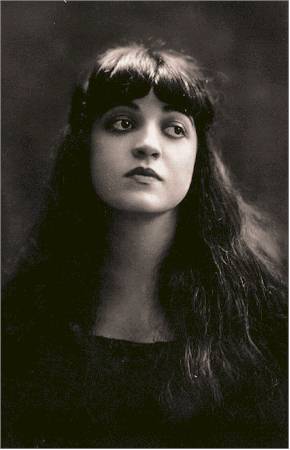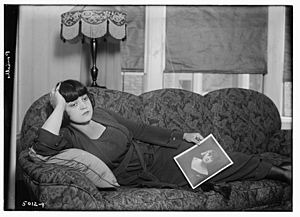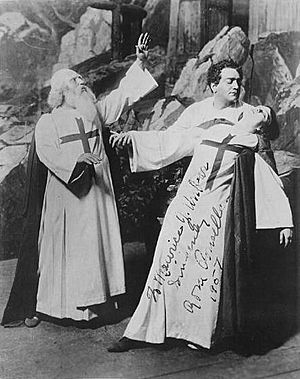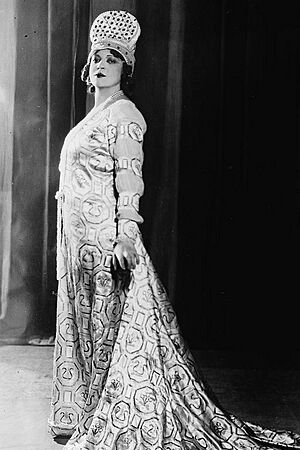Rosa Ponselle facts for kids
Rosa Melba Ponzillo, known as Rosa Ponselle (born January 22, 1897 – died May 25, 1981), was a famous American opera singer. She was a soprano, which means she sang the highest female voice parts.
Rosa Ponselle mostly performed at the New York Metropolitan Opera. Many people believe she was one of the greatest sopranos of the 1900s.
Contents
Early Life and Music Beginnings
Rosa Ponzillo was born in Meriden, Connecticut, on January 22, 1897. She was the youngest of three children. Her parents were immigrants from Italy.
Rosa had a very strong voice from a young age. She didn't have much formal voice training at first. She was also good at playing the piano. A local music teacher, Anna Ryan, helped her with piano.
Rosa's older sister, Carmela, was a cabaret singer. Carmela's example inspired Rosa to sing more. Rosa used to play piano for silent movies in Meriden. During breaks, she would sing popular songs for the audience. By 1914, she became well-known as a singer. She got a job at a large movie theater in New Haven.
From Vaudeville to Opera Star
Her sister Carmela was already a successful singer in vaudeville. Vaudeville was a popular type of entertainment with different acts like singers, dancers, and comedians. In 1915, Carmela helped Rosa get an audition for a vaudeville agent. Even though Rosa was heavier than her sister, her voice impressed everyone. She was hired to perform with Carmela as a "sister act."
Between 1915 and 1918, the Ponzillo Sisters became very popular. They were known as "Those Tailored Italian Girls." They performed in major theaters and earned a lot of money. Their show included traditional songs, Italian songs, and opera pieces.
In 1918, the sisters asked for more money, and their act was dropped. Carmela was studying with a voice teacher named William Thorner in New York. Thorner heard Rosa sing and was very impressed. He then persuaded the famous tenor Enrico Caruso to listen to Rosa. Caruso was a big star at the Metropolitan Opera. He was amazed by Rosa's voice. He arranged an audition for her with the Met's general manager, Giulio Gatti-Casazza. Rosa was offered a contract for the 1918-1919 season.
Metropolitan Opera Debut
Rosa Ponselle made her first opera performance ever at the Metropolitan Opera on November 15, 1918. This was just a few days after World War I ended. She sang the role of Leonora in Verdi's La forza del destino. She performed with Caruso and Giuseppe De Luca.
Rosa was very nervous, especially being on stage with Caruso. But she was a huge success with both the audience and the critics. A critic from The New York Times wrote that she had a beautiful voice. He said it was like "vocal gold" with rich low and middle notes, and bright high notes.
In her first season, Rosa also sang in Cavalleria rusticana and Oberon. In the years that followed, she performed many lead soprano roles. Some of her famous roles included those in Aida, Il trovatore, and La Gioconda. Many people thought her best performance was as Norma in Bellini's Norma in 1927. Besides opera, Rosa also had a successful concert career.
Singing Abroad and Later Career
Rosa Ponselle sang outside the United States only a few times. She performed at Covent Garden in London for three seasons. She also sang in Italy once, to honor a promise to her mother.
In 1929, Rosa made her European debut in London. She sang in Norma and Gioconda. The London audiences loved her. She returned to London in 1930 and 1931, singing in more operas, including La traviata.
In 1933, Ponselle sang in Italy for the only time. She performed in La vestale in Florence. The audiences were very excited. She even had to sing one song again because they cheered so much. She thought about singing at La Scala in Milan, another famous opera house. But after seeing how harshly the Italian audience treated another singer, she decided not to.
Back at the Metropolitan Opera in the 1930s, Ponselle continued to add new roles. In 1935, she sang her first Carmen. Even though audiences loved her Carmen, some critics did not. This made Rosa very sad. In her last two seasons at the Met, she only sang Santuzza and Carmen. These roles were easier on her higher voice. She decided not to renew her contract with the Met. Her last opera performance was as Carmen on April 22, 1937, in Cleveland.
Life After Opera
Rosa Ponselle didn't plan to retire after her last performance in 1937. Her career simply ended. Several things led to this. Her upper voice was becoming harder to use for her main roles. She was also tired after 21 years of performing and dealing with stage fright. She married Carle Jackson in 1936 and enjoyed a more relaxed life. Rosa later said she never missed performing. She and Jackson built a beautiful home called Villa Pace near Baltimore, Maryland, where she lived for the rest of her life.
Her marriage ended in divorce in 1949, which was a difficult time for her. Even though she never performed on stage again, Rosa continued to sing at home for friends. They said her voice was still amazing. In 1954, RCA Records recorded her singing many songs at Villa Pace. These recordings showed her voice was still magnificent even at age 57.
In the late 1940s, Ponselle became a mentor for the new Baltimore Civic Opera Company. She coached young singers, helping them with their voices. Some famous singers who worked with her early in their careers include Beverly Sills and Plácido Domingo.
Death
Rosa Ponselle passed away at Villa Pace on May 25, 1981, at the age of 84. She had been battling bone marrow cancer. She is buried in Druid Ridge Cemetery nearby.
In her obituary, Allen Hughes wrote in The New York Times that Rosa Ponselle made a lasting impression with her amazing voice. He described it as a dramatic soprano voice that could smoothly go from low notes to a high C. She had great flexibility, a wonderful trill, powerful loud parts, and soft, delicate parts.
Recordings
Rosa Ponselle made many recordings throughout her career. She started with early acoustic recordings, then moved to electric recordings, and later magnetic tape. She made 166 commercial recordings in studios or at her home, Villa Pace. There are also live recordings from the 1930s, including full operas and songs from her radio shows. She also made many private recordings at Villa Pace from 1949 to the late 1970s.
Her first recordings were for the Columbia Graphophone Company starting in 1918. She made 44 acoustic recordings for Columbia. Later, in 1923, she signed with the Victor Talking Machine Company. Her electrical recordings for Victor are highly praised. These include famous songs like "Pace, pace mio Dio" and "Casta diva." She also recorded with other famous singers. After 1939, she didn't make any more studio recordings. However, in 1954, RCA Victor recorded her at Villa Pace. These recordings showed her voice was still rich and deep even when she was 57 years old.
During the 1930s, Ponselle often sang on the radio. Many of these broadcasts were recorded. These live recordings include five complete opera performances from the Metropolitan Opera radio broadcasts. Her last opera performance as Carmen in Cleveland in April 1937 was also recorded. These recordings allow us to hear her amazing voice as it sounded live.
Selected Recordings
- 1955 - Rosa Ponselle Sings Today (RCA Records, LM-1889)
- 1957 - Rosa Ponselle in Song (RCA Records, LM-2047)
- 1989 - Ponselle (Nimbus Records, NI 7805)
- 1993 - Rosa Ponselle the Victor Recordings (1923-25) (Romophone, 81006-2)
- Rosa Ponselle: The Columbia Acoustic Recordings; Pearl
- Rosa Ponselle: The Victor Recordings 1925–29; Romophone
See also
 In Spanish: Rosa Ponselle para niños
In Spanish: Rosa Ponselle para niños
 | John T. Biggers |
 | Thomas Blackshear |
 | Mark Bradford |
 | Beverly Buchanan |





